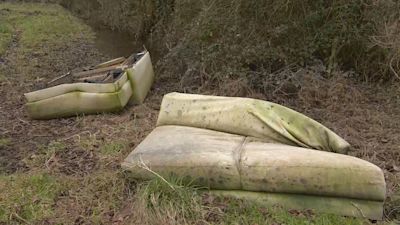'It makes me feel sick' - Landowner says fly-tipping is letting New Forest 'brand' down

WATCH ITV News Meridian's Harry Acton reporting from Bagnum, near Ringwood.
New figures from Defra show there were more than 100,000 incidents of fly-tipping on public land in the South East last year (2022-2023).
Household rubbish, old sofas and bed frames are among items dumped on private land and country lanes.
A landowner in the New Forest says fly-tipping is an increasing problem and he is having to tackle waste himself to protect the environment and wildlife.
Hallam Mills says: "It makes me feel sick of course because it's letting down the brand of the New Forest. It's actually very unpleasant to clear, you get all sorts of unsanitary stuff."
The Country Land and Business Association, which supports rural communities, fears not enough is being done to tackle fly-tipping.
Tim Bamford says: "Quite simply we have got to take this more seriously. We appreciate that local authorities and the government are strapped for cash but we have got to prosecute and penalise those doing it because it is a criminal offence."
Hallam says: "It's increasing, it's getting worse, the amount of rubbish getting dumped, the frequency of it. The callous act of just dumping the contents of plumbing supplies, or beds or old wood from construction is constant. It blocks up all the ditches and leaves the road to flood and then we lose cars."
A spokesperson for New Forest District Council said: "We take incidents of fly-tipping seriously and aim to reduce fly-tipping through increased prosecutions, improved reporting, and education. Fly-tipping is an offence under the Environmental Protection Act 1990 and offenders can face an unlimited fine, a criminal record, and a prison sentence."
The Country Land and Business Association says penalties don't go far enough.
Colin Rayner runs a number of farms across Berkshire and Surrey. He says the illegal dumping of rubbish is escalating.
"We wake up to fly-tipping on one of our farms every morning. It could be a small truckload, a few bags from the back of a car or worst case scenario it could be a 20-ton load.
"We have to make our farms like medieval forts to keep the fly tippers out. We now mainly get it in our gateways and we wake up to this every day.
On public land the council or Environment Agency are responsible for clearance but on private property it falls to the landowner and each time it can cost up to £1,000.
Farmer Colin Rayner says he wakes up to fly-tipping every morning.
Mountains of waste, up to 15-feet high, have been dumped in Hoads Wood near Ashford.
Environment Agency officers have blocked access to this site of special scientific interest as they try to track down the culprits.
Sally Harvey says: "Of course we take action, 454 sites closed down last year and 94 prosecutions. But there is a lot of money to be made by criminals, it's similar to robbery and drug dealing, it's big business."
Martin Hole's has repeatedly had to pay for waste to be cleared from his farm in Hankham outside Eastbourne.
He says: "We have probably a monthly tip into one or other of our gateways, sometimes into water courses and along the lanes around here other farmers face identical rates of tipping."
Access to the site in Ashford has been blocked to prevent further 'illegal' tipping.
In Brighton and Hove fly-tipping is on the increase but in response enforcement officers have issued more penalty notices for it than almost any other council in the country outside of London.
Cllr Tim Rowkins says: "We've had a couple of particularly egregious cases recently where entire van loads of waste has been dumped in beautiful locations on the South Downs.
"And we want the message to be loud and clear that if you do that in Brighton and Hove you will be prosecuted."
Members of the public are also being warned they can be fined if they use a company that later dumps their waste.
Want a quick and expert briefing on the biggest news stories? Listen to our latest podcasts to find out What You Need To Know...